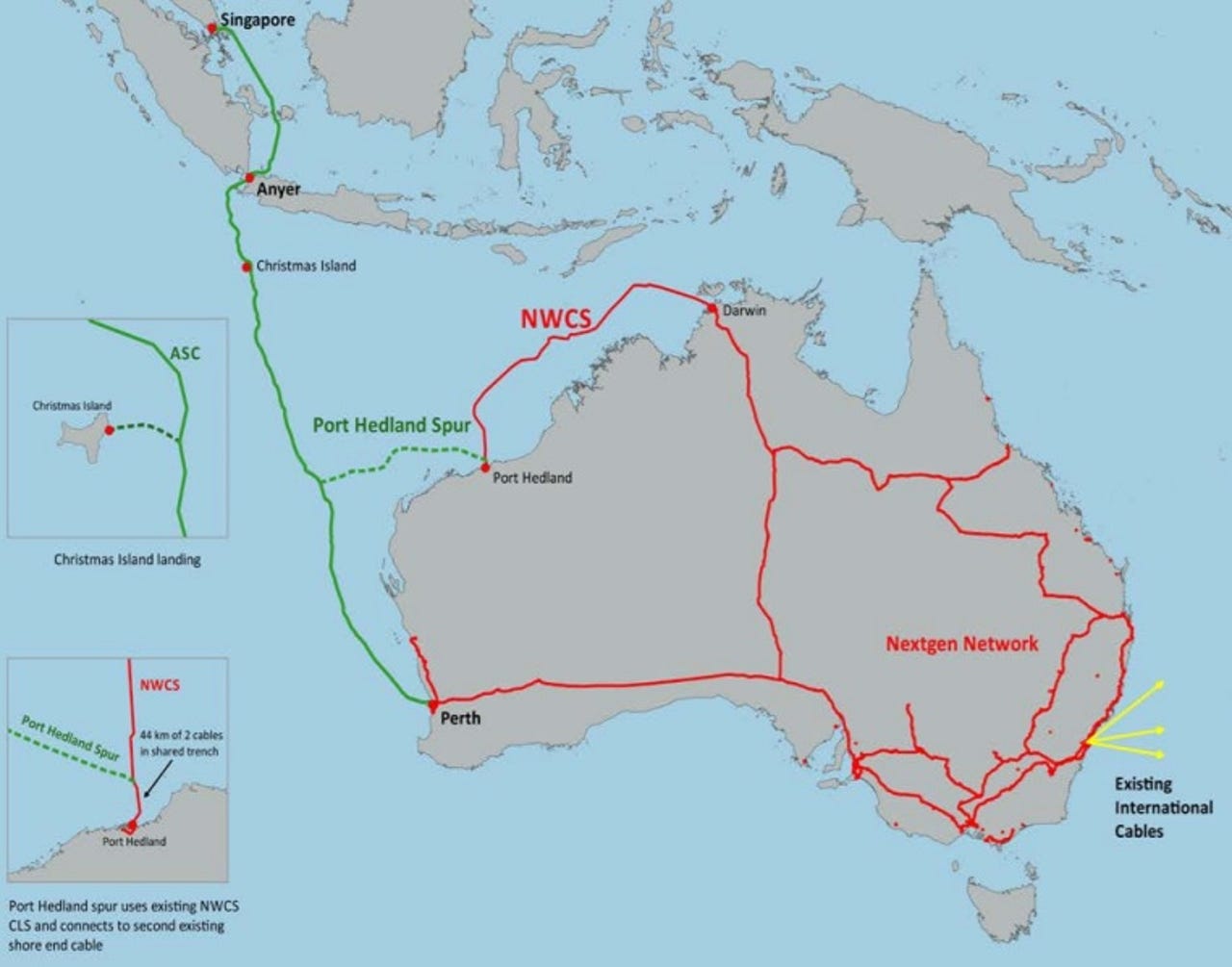Vocus switches on ASC subsea cable system


Vocus has announced switching on its $170 million Australia-Singapore Cable (ASC), with the telecommunications submarine cable system to be ready for service as of September 14.
Until then, Vocus is "finalising its testing phase", according to new CEO Kevin Russell.
"The Australia Singapore Cable will provide the newest, quickest, and most direct route into Asia with the largest increase of international connectivity for Australia into the fastest growing data region in the world," Russell said on Wednesday.
"The technology deployed on the ASC has been selected to easily integrate with the intelligent network management platform Vocus is currently rolling out, offering superior latency over comparable systems."
The cable has additionally been integrated into Equinix's International Interconnection system across the globe, the chief executive said.
The ASC finished being laid in July, with Vocus last week saying 2.5Tbps of capacity has thus far been sold on the subsea cable system to date, including "a major global OTT customer".
"Sales activity is expected to gain further momentum once the system is live in a few weeks and the demand for traffic via Southeast Asia is unlocked," Vocus added.
"ASC will also drive revenue opportunities for our domestic fibre assets as we enter into deep partnerships with key international players."
Vocus began laying the cable in March, with around 3,000km of cable laid by the Ile de Batz ship between Christmas Island and Fremantle through deep water, and 1,600km of cable by the Ile de Ré between Singapore and Christmas Island.
Vocus in February said the ASC remained set to go live in the first quarter of FY19 following the execution of five sales agreements, after saying it would be upgrading its core domestic networks infrastructure to deliver an additional 8Tbps of capacity between Sydney, Perth, and Melbourne ahead of the ASC becoming ready for service.
Vocus had a year ago confirmed that the ASC would be completed ahead of schedule, with services to be launched in July 2018 despite adding a spur to Christmas Island, ahead of competitor cable systems Indigo and Trident.
It signed Alcatel-Lucent Submarine Networks in December to help build the 4,600km ASC, which is designed to carry 40Tbps at a minimum across four fibre pairs.
The ASC was originally a 50-50 joint-venture deal between Vocus and Nextgen Networks. Vocus subsequently purchased Nextgen Networks for AU$700 million in June 2016, paying an additional AU$27 million for the ASC and AU$134 million for the North West Cable System (NWCS), with the $139 million 2,100km fibre-optic NWCS going live in September 2016.
Vocus said it is now working on the AU$137 million contract it was awarded in June by the Australian government to construct the Coral Sea Cable between Australia, Papua New Guinea, and the Solomon Islands.
"We have also made significant progress in this last year towards the implementation of a single advanced core network," Vocus said last week.
"This, together with the ongoing consolidation and decommissioning of legacy assets, the capacity upgrades to our network and the improved capital expenditure disciplines and controls we have implemented, will all deliver ongoing benefits into the future."
Vocus last week reported total group revenue up 2 percent to AU$1.9 billion for FY18, with underlying net profit down 17 percent to AU$127 million while statutory net profit was AU$61 million.
Underlying earnings before interest, tax, depreciation, and amortisation (EBITDA) were stagnant, at AU$366 million, while statutory EBITDA was AU$360 million, up 7 percent.
Subsea cables across the globe
- Vocus' Australia-Singapore Cable (ASC)
- Vocus' North West Cable System (NWCS) between Darwin and Port Hedland
- The Australian government's Coral Sea subsea cable, being constructed by Vocus to connect Australia, Papua New Guinea, and Solomon Islands and funded through the foreign aid budget
- Google's Dunant transatlantic subsea cable between Virginia Beach in the United States to the French Atlantic coast
- The Indigo subsea cable system
- The Indian government's Chennai-Andaman and Nicobar islands subsea cable, being built by NEC
- Southern Cross Cables' NEXT subsea cable system between Australia, New Zealand, and the United States, being built by SubPartners
- The Trident subsea cable system connecting Perth with Singapore via Indonesia
- The Jupiter subsea cable connecting the US, Japan, and the Philippines and being built by a consortium including Facebook, Amazon, SoftBank, NTT Com, PLDT, and PCCW
- The Hawaiki subsea cable between Australia, New Zealand, and the US
- Superloop's Hong Kong cable
- Telstra's Hong Kong Americas (HKA) cable between Hong Kong and the US
- Telstra's Pacific Light Cable Network (PLCN) between Hong Kong and the US
- Google's Japan-Guam-Australia (JGA) cable system
- The Asia-Pacific Gateway (APG) subsea cable connecting China, Hong Kong, Japan, South Korea, Malaysia, Taiwan, Thailand, Vietnam, and Singapore, owned by a consortium including China Telecom, China Unicom, China Mobile, NTT Communications, KT Corporation, LG Uplus, StarHub, Chunghwa Telecom, CAT, Global Transit Communications, Viettel, and VNPT, and being constructed by NEC
- The Southeast Asia Japan 2 cable (SJC2), which will have 11 landing stations in Singapore, Thailand, Cambodia, Vietnam, Hong Kong, China, South Korea, Taiwan, and Japan, being built by NEC and funded by a consortium including China Mobile International, Chunghwa Telecom, Chuan Wei, Facebook, KDDI, Singtel, SK Broadband, and VNPT
- The Bay to Bay Express Cable System (BtoBE), connecting Singapore and Hong Kong with the US, being funded by consortium including Facebook, Amazon Web Services (AWS), and China Mobile International, and being built by NEC